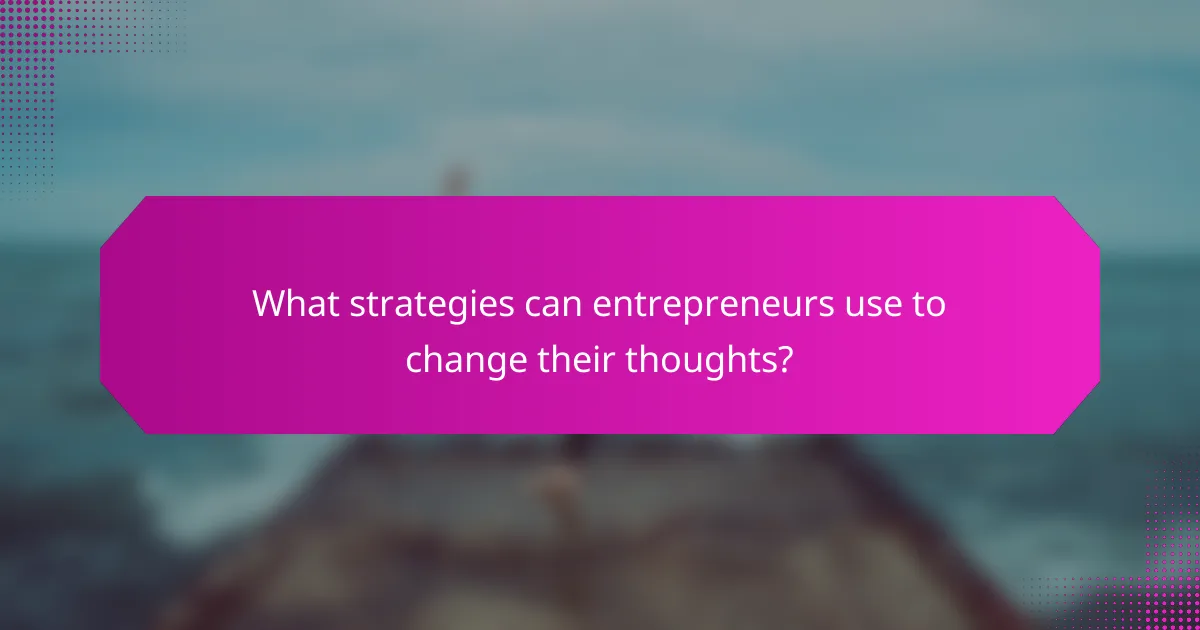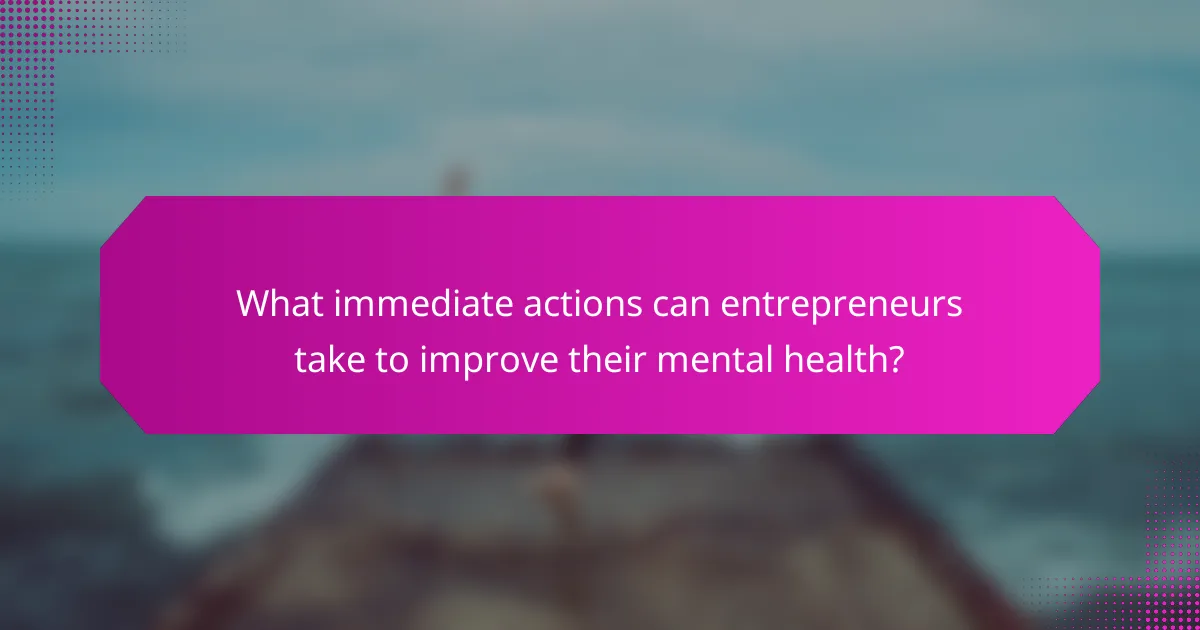Entrepreneurs often struggle with anxiety, stress, and isolation due to high-pressure environments and the demands of running a business. Understanding these mental health challenges is essential for personal well-being and business success. This article explores effective strategies like mindfulness, building support networks, and setting realistic goals to overcome these issues. By changing thoughts and adopting proactive mental health practices, entrepreneurs can enhance their resilience and productivity.

What mental health challenges do entrepreneurs face?
Entrepreneurs face mental health challenges including anxiety, stress, and isolation. These issues stem from high-pressure environments, uncertainty, and the demands of running a business. Research shows that 72% of entrepreneurs experience mental health concerns, significantly higher than the general population. Addressing these challenges is crucial for personal well-being and business success. Strategies like mindfulness, seeking support, and setting boundaries can mitigate these effects.
How does anxiety manifest in entrepreneurial settings?
Anxiety in entrepreneurial settings often manifests as self-doubt, fear of failure, and isolation. Entrepreneurs may experience heightened stress due to uncertainty and pressure to succeed. This can lead to decision paralysis, impacting productivity. Recognising these patterns is crucial for managing anxiety effectively. Techniques such as mindfulness and cognitive restructuring can help alter negative thought patterns, fostering resilience.
What are the common stressors for business owners?
Common stressors for business owners include financial pressures, time management challenges, and the burden of decision-making. Additionally, isolation and lack of support can exacerbate these stressors. According to a study, 70% of entrepreneurs report feeling overwhelmed by their responsibilities. These factors contribute to anxiety and stress, making it crucial for business owners to develop coping strategies.
How does isolation impact entrepreneurs’ mental health?
Isolation negatively impacts entrepreneurs’ mental health by increasing anxiety and stress levels. This often leads to feelings of loneliness and decreased motivation. Entrepreneurs may experience unique attributes of isolation, such as heightened self-doubt and difficulty in decision-making. As a result, they may struggle to maintain a healthy work-life balance, which can exacerbate mental health issues. Addressing these challenges through support networks and mental health resources is essential for fostering resilience and well-being.

What are the universal attributes of mental health challenges in entrepreneurship?
Mental health challenges in entrepreneurship often include anxiety, stress, and isolation. These issues stem from high pressure, financial uncertainty, and the demands of leadership. Entrepreneurs frequently experience a unique attribute of emotional volatility, which can exacerbate mental health concerns. Additionally, the root attribute of lack of support networks can lead to feelings of isolation, making it difficult to seek help. As a result, understanding these universal attributes is essential for developing effective coping strategies.
How does work-life balance contribute to mental health issues?
Work-life balance significantly impacts mental health by reducing stress and preventing burnout. Entrepreneurs often face unique challenges that can lead to anxiety and isolation. Maintaining boundaries between work and personal life fosters emotional well-being. Research indicates that individuals with a balanced lifestyle report lower levels of anxiety and improved overall mental health. Prioritising work-life balance can enhance productivity and creativity, essential for entrepreneurial success.
What role does financial pressure play in stress levels?
Financial pressure significantly increases stress levels for entrepreneurs. The constant worry about cash flow, expenses, and profitability can lead to anxiety and isolation. Studies show that financial stress is a unique attribute affecting mental health, with 72% of entrepreneurs reporting heightened stress due to financial concerns. As a result, managing financial pressure through budgeting and seeking support networks can mitigate stress. Addressing these challenges is crucial for maintaining overall well-being and productivity.
How does the fear of failure affect mental well-being?
The fear of failure significantly impacts mental well-being by increasing anxiety and stress levels. Entrepreneurs often experience heightened pressure to succeed, which can lead to isolation and decreased motivation. This fear can create a cycle where avoidance of challenges further exacerbates feelings of inadequacy. As a result, addressing these fears through mindset shifts is crucial for improving overall mental health and fostering resilience.

What unique mental health challenges do entrepreneurs encounter?
Entrepreneurs face unique mental health challenges, including heightened anxiety, chronic stress, and feelings of isolation. These issues stem from the pressures of decision-making, financial uncertainty, and the lack of social support. As a result, many entrepreneurs experience burnout and reduced overall well-being. Addressing these challenges requires proactive mental health strategies, such as mindfulness practices and seeking professional support.
How does the need for constant innovation lead to stress?
The need for constant innovation can lead to significant stress for entrepreneurs. This pressure arises from the expectation to consistently generate new ideas and adapt to market changes. As a result, feelings of anxiety and isolation often intensify, impacting overall well-being. Entrepreneurs may experience a unique attribute of stress due to the fear of falling behind competitors. This relentless pursuit of innovation can create a cycle of burnout, making it challenging to maintain a healthy work-life balance.
What are the effects of decision fatigue on business owners?
Decision fatigue significantly impacts business owners by reducing their ability to make effective choices. This mental exhaustion leads to impulsive decisions, decreased productivity, and increased stress levels. As a result, entrepreneurs may struggle to manage their time and resources efficiently, ultimately affecting their business outcomes. Prioritising self-care and implementing structured decision-making processes can help mitigate these effects.
How does the entrepreneurial identity influence mental health?
The entrepreneurial identity significantly impacts mental health by shaping thought patterns and coping mechanisms. Entrepreneurs often face unique stressors, including uncertainty and isolation, which can exacerbate anxiety and depression. Research indicates that a strong entrepreneurial identity can lead to resilience, but it may also create pressure to maintain constant productivity. This duality emphasises the importance of mindset management in fostering mental well-being. Entrepreneurs who adopt positive thinking strategies often experience improved emotional health, showcasing the connection between thoughts and life outcomes.

What rare mental health issues can entrepreneurs experience?
Entrepreneurs can experience rare mental health issues such as impostor syndrome, which leads to chronic self-doubt, and entrepreneurial burnout, characterised by emotional exhaustion. These challenges can significantly impact their well-being and productivity. Entrepreneurs may also face social anxiety, which can hinder networking opportunities essential for business growth. Understanding these unique attributes of mental health challenges is crucial for developing effective coping strategies.
How can imposter syndrome uniquely affect entrepreneurs?
Imposter syndrome can significantly impact entrepreneurs by fostering self-doubt and hindering decision-making. This psychological pattern often leads to anxiety, stress, and feelings of isolation. Entrepreneurs may question their capabilities, which can stifle creativity and innovation. As a result, they may miss opportunities for growth and networking. Addressing imposter syndrome is crucial for maintaining mental well-being and achieving success in entrepreneurship.
What are the signs of burnout specific to business owners?
Business owners often experience burnout through signs such as chronic fatigue, feelings of isolation, and reduced productivity. They may also encounter increased irritability, lack of motivation, and difficulty concentrating. Recognising these symptoms early can help address the underlying issues and promote a healthier work-life balance.
How does the pressure of public perception create mental strain?
Public perception can create significant mental strain by amplifying anxiety, self-doubt, and feelings of isolation in entrepreneurs. The pressure to meet societal expectations often leads to stress, as individuals fear judgment and failure. This strain can hinder decision-making and creativity, ultimately impacting business success. Entrepreneurs may feel compelled to present a façade of confidence, which can exacerbate feelings of loneliness and overwhelm. Addressing these challenges through mindset shifts and support networks is crucial for mental well-being.

What strategies can entrepreneurs use to change their thoughts?
Entrepreneurs can change their thoughts by practicing mindfulness, reframing negative beliefs, and seeking support. Mindfulness helps in managing anxiety and stress, allowing for clearer thinking. Reframing involves replacing negative thoughts with positive affirmations. Seeking support from peers or mentors can provide new perspectives and reduce feelings of isolation. These strategies can foster resilience and enhance overall well-being, leading to improved decision-making and productivity.
How can cognitive behavioral techniques reduce anxiety?
Cognitive behavioral techniques can significantly reduce anxiety by changing negative thought patterns. These techniques help identify irrational beliefs and replace them with more balanced thoughts, leading to decreased anxiety levels. Research indicates that individuals using cognitive behavioral therapy report a 50% reduction in anxiety symptoms, enhancing emotional resilience. Moreover, practicing these techniques regularly fosters a proactive mindset, empowering entrepreneurs to manage stress and isolation effectively.
What role does mindfulness play in managing stress?
Mindfulness significantly aids in managing stress by promoting present-moment awareness. This practice helps entrepreneurs reduce anxiety and isolation, enabling clearer thinking and better decision-making. Research indicates that mindfulness can lower cortisol levels, which are linked to stress. Regular mindfulness practice enhances emotional regulation, allowing individuals to respond to stressors more effectively. Additionally, integrating mindfulness techniques into daily routines fosters resilience, ultimately transforming stress into a manageable aspect of entrepreneurial life.
How can social connections mitigate feelings of isolation?
Social connections can significantly reduce feelings of isolation by fostering a sense of belonging and support. Engaging with others provides emotional reinforcement, which can alleviate stress and anxiety. Studies show that strong social ties lead to improved mental health outcomes. For entrepreneurs, building a network can enhance resilience, offering shared experiences and advice that counteract feelings of loneliness. The unique attribute of community support creates opportunities for collaboration and motivation, further mitigating isolation.

What immediate actions can entrepreneurs take to improve their mental health?
Entrepreneurs can take immediate actions to improve their mental health by practicing mindfulness, establishing a support network, and setting realistic goals. Mindfulness techniques, such as meditation or deep breathing, can reduce anxiety and stress. Building a support network helps combat isolation by fostering connections with peers and mentors. Setting realistic goals prevents overwhelm and promotes a sense of achievement, enhancing overall well-being.
What are the best practices for maintaining mental well-being?
To maintain mental well-being, entrepreneurs should adopt practices that foster positive thinking and resilience. Regular mindfulness exercises, such as meditation or deep breathing, can reduce anxiety and stress. Engaging in physical activity boosts mood and enhances overall mental health. Building a support network of fellow entrepreneurs encourages connection, reducing feelings of isolation. Setting realistic goals and celebrating small achievements fosters motivation and a sense of purpose. Lastly, seeking professional help when needed is crucial for long-term mental well-being.
What common mistakes should entrepreneurs avoid in managing stress?
Entrepreneurs should avoid overcommitting, neglecting self-care, isolating themselves, and failing to seek support. These mistakes can exacerbate stress and hinder productivity. Prioritising mental health is essential for sustainable success. A 2021 study found that 70% of entrepreneurs experience anxiety, highlighting the need for effective stress management strategies.
How can seeking professional help enhance mental resilience?
Seeking professional help significantly enhances mental resilience by providing tailored strategies and support. Professionals can offer cognitive-behavioral techniques that reshape negative thought patterns, which is crucial for entrepreneurs facing anxiety and stress. Regular sessions foster accountability and encourage proactive coping mechanisms. Furthermore, engaging with a therapist or coach can help in building a robust support network, essential for overcoming isolation. This multifaceted approach not only addresses immediate concerns but also equips individuals with lifelong skills to navigate future challenges effectively.
What expert insights can guide entrepreneurs in overcoming mental health challenges?
Entrepreneurs can overcome mental health challenges by adopting cognitive restructuring techniques, practicing mindfulness, and building strong support networks. These strategies help in managing anxiety, stress, and feelings of isolation. Cognitive restructuring allows individuals to identify and challenge negative thought patterns, promoting a more positive mindset. Mindfulness practices, such as meditation, enhance emotional regulation and reduce stress levels. Additionally, connecting with fellow entrepreneurs fosters a sense of community and shared experience, alleviating feelings of isolation. Engaging in these practices can significantly improve overall mental well-being and resilience in the entrepreneurial journey.


